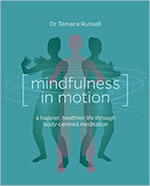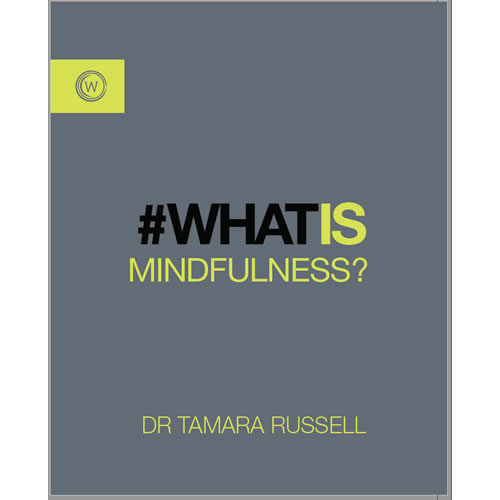Blog
Mindfulness in Motion
Mindfulness in Motion is my life and my joy.
For me, studying the movement of the body helps me to study the movement of mind.
Did you know that recent neuroscientific discoveries suggest that thoughts are just movements trapped in the brain?
This speaks to my own intuitive experience. Through studying movement at a deep level - not only has it been possible to learn more about my body and develop emotional awareness, it has also transformed my ability to learn how my mind moves.
We all have different ways of thinking and being in the world. The way our minds moves is as unique as the way our bodies moves. We have some of the same "architecture" and processes, but we all express in our own unique and beautiful way.
When we work with movement for our mindfulness training journey there are so many benefits including
- we don't need a cushion
- our moving body is a training tool with us at all the time
- it's great for the wrigglers out there (those with busy bodies or busy minds)
- it makes it easier for those experiencing intense mental and physical states to access mindfulness
- it helps you to train mental and physical health at the same time (great for busy people or those who love to be efficient).
Find out more in my book Mindfulness in Motion. Ruby Wax read the book and said "This is by far the clearest book on mindful movement and just reading it puts you in the moment. It's wonderful."
Some Amazon reviews:
I have only just started reading this but I can tell already it is going to be extremely helpful. I have tried the sitting meditations during a silent retreat and I just fall asleep. This is all about moving whilst mindful and the author brings a huge amount of practical and academic experience to her exercises. My best book of the year so far :-)
Excellent, easy to read book, one of the best I've found.
The author is amazing with her thoughts and correlation of mind and body... Research and logic simple annalysis. Thank you

What is Mindfulness?
What a great question, and one I am asked all the time. So much so, I wrote a book for those new to mindfulness to help them get straight with the basics (#whatismindfulness).
In this book I offer a brief outline of all the things you need to know to about mindfulness - the history of mindfulness, where it comes from, what some of the basic terminology refers to and how to get going on your own mindfulness journey.
Not only that, in this book there is a whole chapter on how you can best prepare for a secular mindfulness journey. This is really important. If you decide you want to exercise, you rarely just join the first gym you walk past. You think about your goals or aims for exercise, you reflect on your body type and current level of fitness. You might even think about your budget and time resources. All of these allow you to select the right type of exercise, class and approach for you to ensure you get what you need from exercise. It's the same with mindfulness. There are many approaches and options - courses, books, apps, mentoring, trainers etc. What will help you be efficient in your mindfulness training journey is taking time to tune into your intentions, context, learning style and motivations.
There is also a chapter that outlines what your brain needs to do in order to activate the three key brain networks you need to exercise in order to get the benefits of mindfulness. They include the attention network (which helps you to focus), the default mode network (which helps you to recognize what your mind is doing) and the salience network (which helps you to understand any patterns of reactivity when you meet challenge).
A functional definition of mindfulness is offered. Mindfulness is the attempt to reduce the amount of time when we are distracted, reactive and judgemental, whilst at the same time increasing the amount of time we are present, responsive and kind. It is the rare individual who can maintain full mindfulness all the time. I take a more realistic approach - you are mostly much more likely to be mindless than mindful - so our task is to know both states intimately and be kind when we see we are not where we wanted to be. THIS is the secret to accelerating your mindfulness development.
Sounds easy right? Well, when we start to observe our body and mind we can discover that it's not as easy as it sounds. We all have different starting points and circumstances so it's wise to really take the time to plan your journey and think about what you want to get out of it.
If you want to find out more, check out the book #whatismindfulness.
Amazon 5* Review
"This is a serious and insightful look at modern Mindfulness. As an author of a book detailing my own discovery of meditation as a way to Mindfulness, I applaud Tamara Russell's treatment of Mindfulness as a spiritual and secular experience! She shares tremendous insight into how life changing and powerful Mindfulness can be!"
Amazon 4* review
"A comprehensive book explaining in a concise and easy to read manner on the subject of mindfulness. I contains the what, why, how, when and where about mindfulness and how anyone can use it to improve their life. Mindfulness has many similarities to other disciplines such as meditation and yoga, but heas enough differences to be distinct. Even if you are sceptical about mindfulness, the book is still an interesting read. The book itself is a handy A5 size, which makes it easy to carry around – perfect to dip in and out of when you are on the go and need to refer to it."

